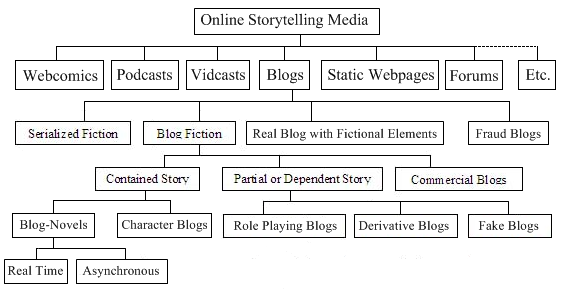After much discussion, here is our current proposal for a blog fiction typology:

- Print Fiction: The universe of print-based fictional works published as books, newspapers, or periodicals.
- Faux Blogs: Print-based fictional works that mimic the format and presentation of a web-based personal journal or diary.
- Web Fiction: The universe of web-based fictional works published as HTML, text files, PDFs, multimedia files, and/or RSS feeds.
- E-books: Substantially-sized web-based works of fiction that are presented as a complete work in itself. E-books may be edited compilations of serialized fiction or may themselves be part of a series of similar works.
- Serialized Fiction: Web-based works of fiction published in installments. Serialized fiction may use blogging software as a publishing platform but with a narrative format other than a personal journal or diary. Material in this category may be adapted from or intended for an offline print format.
- Real Blog With Fictional Elements: Web-based works that purport to be the factual personal diaries or journals of flesh-and-blood authors but are embellished with clearly-identified fictional elements or elements that are obviously fictional to a casual reader.
- Fraud Blogs: Web-based works that purport to be the factual personal diaries or journals of flesh-and-blood authors but are entirely fabricated or predominantly embellished with fictional elements that are presented as real. Warning: when the fictional nature of these blogs is revealed, readers may be royally pissed off!
- Blog Fiction: Web-based works that use a blogging platform to present the personal journal or diary of one or more in-story characters and are either presented as fiction or would be obviously fictional to a casual reader.
- Blogvertisements: Fictional blogs that primarily advertise a product rather than tell a story.
- Contained Story: Fictional blogs that stand alone, containing all the information required for a reader to understand the story.
- Blog-Novels: Traditionally-structured stories with a clearly-intended beginning, a clearly-intended middle, and (if the story is not still being written or on a clearly-intended hiatus) a clearly-intended ending. Structure is what distinguishes a blog-novel from unstructured character blogs and blogs of genuinely unstructured life.
- Character Blogs: Character-driven works in the voice of a fictional character engaged in fictional events, but without a traditionally structured plot.
- Partial or Dependent Story: Fictional blogs for which required plot points are given in another medium, or that require a reader to be familiar with the blogging character from another source.
- RPBs: (a.k.a. Role-Playing Blogs) Works in which individual authors have taken on individual character roles which they maintain while blogging about each other's characters.
- Derivative Blogs: Works purporting to be the personal online journal or diary of an existing fictional character from another medium.
- Fake Blogs: Works purporting to be the personal online journal or diary of a contemporary or historical figure where it is clearly stated that the blog is fake or that fact would be obvious to a casual reader.



No comments:
Post a Comment